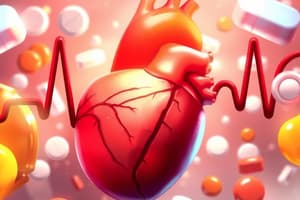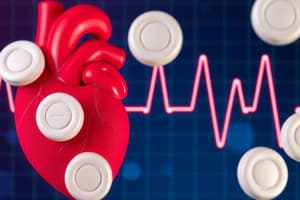Podcast
Questions and Answers
What does Renin convert Angiotensin to?
What does Renin convert Angiotensin to?
- Ang III
- Ang I (correct)
- Ang II
- Ang IV
Which of the following hormones worsens blood pressure?
Which of the following hormones worsens blood pressure?
- Ang II
- Natriuretic peptide
- Aldosterone (correct)
- Renin
What is the effect of Angiotensin II on blood vessels?
What is the effect of Angiotensin II on blood vessels?
- No effect
- Vasoconstriction (correct)
- Vasodilation
- Increased permeability
Which pathway is NOT a function of ACE?
Which pathway is NOT a function of ACE?
What effect does dehydration have on kidney function?
What effect does dehydration have on kidney function?
What do ACE inhibitors primarily block?
What do ACE inhibitors primarily block?
What is one role of Aldosterone in blood pressure regulation?
What is one role of Aldosterone in blood pressure regulation?
Which receptors are targeted by ARBs?
Which receptors are targeted by ARBs?
Flashcards are hidden until you start studying
Study Notes
General Concepts of Cardiac Function
- Afterload refers to the resistance the heart must overcome to eject blood, influenced by systemic vascular resistance.
- Preload is the initial stretching of the cardiac muscle fibers and is proportional to the volume of blood filling the heart.
Key Pharmacological Agents
- Beta-blockers reduce heart rate and contractility, helping manage blood pressure.
- Diuretics promote urine production to reduce excess fluid, lowering blood volume and blood pressure.
- Statins lower cholesterol levels, reducing cardiovascular disease risk by managing lipid profiles.
Renin-Angiotensin System (RAS)
- The RAS plays a crucial role in blood pressure regulation through hormone reactions.
- Renin converts Angiotensinogen to Angiotensin I; subsequently, ACE converts Angiotensin I to Angiotensin II.
- Angiotensin II is a potent vasoconstrictor that increases blood pressure and stimulates aldosterone secretion.
Effects of Hormones
- Aldosterone promotes sodium reabsorption in the kidneys, contributing to fluid retention and increased blood volume.
- Dehydration reduces kidney perfusion, triggering renin release and activation of the RAS.
Vascular Interactions
- Angiotensin II interacts with Gq protein-coupled receptors on vascular smooth muscle, facilitating vasoconstriction.
- ARBs (Angiotensin II Receptor Blockers) like Valsartan block this action, reducing hypertension.
Treatment Strategies
- ACE inhibitors prevent the formation of Angiotensin II, alleviating hypertension by relaxing blood vessels.
- Use of aldosterone antagonists like spironolactone can prevent sodium retention and reduce blood pressure effectively.
Cardiac Adaptation
- Over time, the heart and blood vessels can adapt to chronic stressors, such as hypertension or volume overload, potentially leading to hypertrophy or remodeling.
- Adjustments in response to preload and afterload can affect overall cardiovascular health and function.
Studying That Suits You
Use AI to generate personalized quizzes and flashcards to suit your learning preferences.




